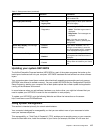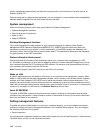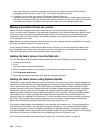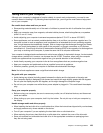
system-management applications), and have the computer start up and function in the same way as an
ordinary desktop PC.
Once the computer is congured and operational, you can manage it by use of software and manageability
features already integrated into the client system and the network.
System management
Check the following topics to learn more about features of System Management:
• Desktop Management Interface
• Preboot eXecution Environment
• Wake on LAN
• Asset ID EEPROM
Desktop Management Interface
The Unied Extensible Firmware Interface of your computer supports an interface called System
Management BIOS Reference Specication(SMBIOS) V2.4. SMBIOS provides information about the
hardware components of your system. It is the responsibility of the BIOS to supply this database with
information about itself and the devices on the system board. This specication documents the standards
for getting access to this UEFI information.
Preboot eXecution Environment
Preboot eXecution Environment (PXE) technology makes your computer more manageable (it is PXE
2.1-compliant) by enabling it to boot (load an operating system or another executable image) from a server.
Your computer supports the PC functions that PXE requires. For example, with the appropriate LAN card,
your computer can be booted from the PXE server.
Note: Remote Program Load (RPL) cannot be used with your computer.
Wake on LAN
A network administrator can use Wake on LAN to turn on a computer from a management console. When
Wake on LAN is used with network management software, many functions, such as data transfer, software
updates, and Flash updates of UEFI BIOS, can be performed remotely without remote attendance. This
updating can be done after normal working hours and on weekends, to save time and increase productivity.
Users are not interrupted during normal working hours, and LAN trafc is kept to a minimum. If a computer is
turned on by the Wake on LAN function, the Network Boot sequence is used.
Asset ID EEPROM
The Asset ID EEPROM contains information about the system, including its conguration and the serial
numbers of key components. It also includes a number of blank elds in which you can record information
about the end users in your network.
Setting management features
To enable the network administrator to control your computer remotely, you must congure the network
interface by setting the system-management features in the ThinkPad Setup program. You can congure
the following functions in the program:
• Startup sequence
If an administrator's password (supervisor password) has been set, you will need to specify it when you start
ThinkPad Setup, so that you can use these functions.
118 User Guide


















